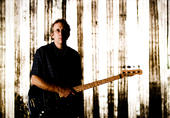What do Emmylou Harris, Dolly Parton, Sam Bush, Jerry Douglas and Jorma Kaukonen all have in common? For one thing, they are among the most respected musicians and artists in American popular music over the last four decades. For another, they have all at one time or another sought out the services of Byron House, currently one of Nashville’s—and the country’s—hardest working bass players, both in the studio and on the road.
Versatile, tasteful, unique, spontaneous and, most of all, musical—these are the words most commonly used to describe Byron’s bass playing. But it was banjo that first inspired him to seriously pursue a musical career. His musical path got off to an auspicious beginning, when, at age 11, he met and jammed with Sam Bush, who was already a world-class mandolinist and fiddler who had only recently formed the groundbreaking New Grass Revival.
At age 17, after 7 years of honing his banjo chops (he also dabbled in guitar, dulcimer, trumpet, bassoon, percussion, piano and other instruments), Byron switched to bass, after hearing Jaco Pastorius’ revelatory bass work on Weather Report’s Heavy Weather. “I heard his playing,†Byron says, “and I realized what that instrument could do; not only play the more traditional supportive role, but also add harmony lines in a way that would not only support the melody and the other instruments but also serve as a catalyst to the other players. Yet it was so subtle and carefully played. I went home and did some woodshedding for a year, playing his records over and over.â€
Other bass players that influenced Byron in his formative years include Paul McCartney, James Jamerson, Phil Lesh, Jack Casady, Ray Brown, Paul Chambers, Junior Huskey and Roy Huskey.
In the mid-1980s, Byron left his hometown of Bowling Green, Ky., and relocated to Nashville, opening up a new universe of musical possibilities. He was soon working steadily with Foster & Lloyd, and his reputation quickly spread through Music City. In addition to Parton, Harris, Kaukonen and Douglas, Byron has performed or recorded with Buddy and Julie Miller, Nitty Gritty Dirt Band, Linda Ronstadt, Jim Lauderdale, Dixie Chicks, Nickel Creek, Jimmie Dale Gilmore, Shelby Lynne, Clay Walker, Al Kooper and Grateful Dead lyricist Robert Hunter, to name a few. He was honored with a Grammy nomination in 2005 for his work on Mark O’Connor’s 30-Year Retrospective.
In 1999, almost 30 years after that first jam session with Sam Bush, Byron’s musical career came full-circle, when he landed the enviable bass gig in Bush’s prolific touring band. “Byron is the first choice for the upright acoustic bass," Bush says. “He also plays just as well on the electric and fretless, which makes him as versatile as he is accomplished. With Chris Brown on drums and Byron on bass, I have a rhythm section that allows for limitless possibilities; we can play every musical genre, from reggae to bluegrass to rock. He is also a good friend and understands that being a road musician means being able to get along with your players. Byron is the best.â€
Many other musicians are quick to sing Byron’s praises. “Working with Byron House is an incomparable musical experience,†Kaukonen says. “He brings so much with him when he comes. Whether you need upright, fretless or electric bass, playing with him makes you feel as if he has always been in your band and that you would be lost without him. As if that weren’t enough, you can count on him for background vocals. He is a consummate professional as well as an intuitive player. I am proud to call him a friend and a peer!â€
Byron lives near Nashville with his wife, Karen, and their two sons, Truman and Henry. His musical career—tours, TV appearances and recording sessions with established stars as well as up-and-coming acts—is more fulfilling than he could have ever imagined, and he knows as well as anyone just how fortunate he is. “I consider the excitement of the work I do and the intricacies of this instrument a challenge and an inspiration,†Byron says. “As long as I can continue to be creative—whether on stage or in the studio—then I feel I’m being true to the art. Music is a special language; I appreciate what it does for people and feel I am truly blessed to be a part of that process, interacting with the artists that are dedicated to all that music means to them and their audience.â€
Written by Jack Silverman
Interviews by Lynn Manderson
